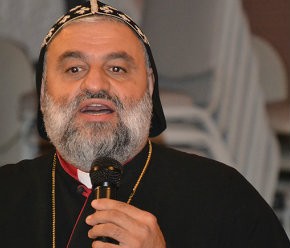Out of Syria: Archbishop Cyril Karim

Cyril Karim is archbishop of the Syrian Orthodox Church of Antioch for the Eastern United States of America, which is affiliated with the Syrian (Oriental) Orthodox Church of Syria. The Syrian Orthodox Church counts 32 parishes and 33,000 members in the United States. Born in Syria, Archbishop Karim studied in Egypt and Ireland. He is the author of a children’s book, In the Tree House. In New Jersey, where the archdiocese has its offices, he led protests against the possibility of an American military strike on Syria.
Tell us a bit about Syrian Christianity.
On my first visit to the United States, I was wearing my clerical robes and the man sitting next to me asked, “Are you a priest?” I said, “Yes, I am a priest in the Syrian Orthodox Church.” He said, “There are Christians in Syria?”
Then he asked, “When did you convert to Christianity?” I told him, “I really don’t remember, but it must have been some 2,000 years ago.” Unfortunately, there is much ignorance in the West about Christians in the Middle East.
Our church is the Syrian Orthodox Church of Antioch. Antioch was the place where the early apostles established themselves when they fled persecution in Jerusalem. It was in Antioch that Christians first called themselves Christians.
For our liturgy we use Aramaic, the language of Christ, the apostles and the early church. We use a Syrian dialect of Aramaic that is called Syriac.
Of course, there are many other Christian churches in Syria: the Antiochian Orthodox Church (also called the Greek Orthodox Church of Antioch), as well as Catholic and Protestant churches that were formed in the last three centuries, largely by taking members from the Orthodox churches. But now relations among the Christians in Syria are very good.
Read our latest issue or browse back issues.
What has been the history of Syrian Orthodox Christians in the United States?
The presence of Syrian Orthodox people in the United States goes back to the 1850s. The first organized parish was in Newark, New Jersey, in 1907. Since then waves of immigrant groups have come, either fleeing persecution or looking for better economic conditions. After 1991 and again after 2003 our churches have been receiving refugees from Iraq. Now with the war in Syria, God only knows how many people will end up here. They will try their best to make it.
So the Syrian Orthodox Church has people from many nationalities?
The word Syrian in the Syrian Orthodox Church does not mean Syrian as a matter of nationality. Our community of believers existed, obviously, before the nation of Syria. We gave the nation our name, not the other way around.
Only about 30 to 40 percent of the people in our parishes come from the country of Syria. Many of them are first-, second- or in some cases third-generation immigrants. The rest come from other areas in the Middle East such as Turkey, Iraq, Jordan, Palestine, Egypt and Lebanon.
Do you use Syriac in your worship services in the United States?
We do use Syriac, but we also use English—and in some parishes Arabic.
How do Syrian Orthodox people view the Assad regime?
The majority of our people, whether from Syria or from another country, see the Assad regime as friendly. Our church in Syria has been well treated by the Assad regime.
The regime recognized us as the indigenous people of Syria, who kept the language and preserved the country’s identity and culture. Christians pioneered in teaching. Christians were looked upon as highly educated, high-achieving people. We never experienced discrimination or ill-treatment by the majority of the Syrian people, who are Sunni. Until recently, Syria was not a place where you asked about someone’s religious affiliation.
Now we see Christians being targeted, churches being bombed, clergy being killed or kidnapped. Two of our archbishops were kidnapped on April 22, and there has been no word from them. All we know is that they were kidnapped by jihadists from Chechnya. What business do they have in Syria? I don’t know.
Are all Christian voices united in their support of the regime?
Certainly there are Christians who are standing with the so-called revolution. These are people who are looking for real reforms in the country, who are proponents of democracy. They are a very small minority, and they are mostly affiliated with political parties that oppose the Assad regime, such as the Communist Party.
When I say that the majority of Christians are not against the regime, I do not mean that we support it no matter what. All of us have criticisms about the way things were going in Syria—such as the amount of corruption among public officials and the lack of many freedoms. But in Syria, we Christians were left alone to live and to witness to our faith. We could not seek to convert others, but we lived with Islam peacefully for 1,500 years.
Our fear is about what happens next. Who is going to take over? Al-Qaeda is much stronger on the ground than the Free Syrian Army. Al-Qaeda forces are eradicating the army and appear to be the strongest group in Syria now. If al-Qaeda takes over, what will happen to Christians?
Why do you oppose a strike by the United States against Syria?
Because a strike will not help anybody. It will not help Americans pursue their interests—although, to be honest, I don’t know what the U.S. interest is in Syria. Americans speak of “national interests,” but what are they? Syria is 7,000 miles away from here.
What are you doing to help Christians inside Syria?
There are millions of displaced people inside Syria. We are sending money for rent and food. We are also taking care of refugees in Lebanon, Jordan and other areas.
Unfortunately, many of Christianity’s ancient places in Syria have been destroyed. In Homs, the Church of the Virgin Mary of the Holy Belt, which can be traced to the first century—when the first Christians worshiped in a cave on that spot—was destroyed in fighting between the Islamists and the government.
Are you in touch with Christians in refugee camps?
Christians do not usually go to refugee camps. One reason is that such camps very often exist for families of the fighters against the government. Most of these are Islamic fighters, and Christians cannot live with such groups in which there is no tolerance. Second, Christians tend to go to places where there are sizable populations of other Christians, like Lebanon. Third, few of the displaced Christians will go back to Syria, so they are not sitting in camps waiting to be resettled. They are going to Turkey or Lebanon in order to go on to a third country.
Iraq provides an example. Within ten years, 75 percent of Christians have left Iraq. The same thing, unfortunately, will happen in Syria.






